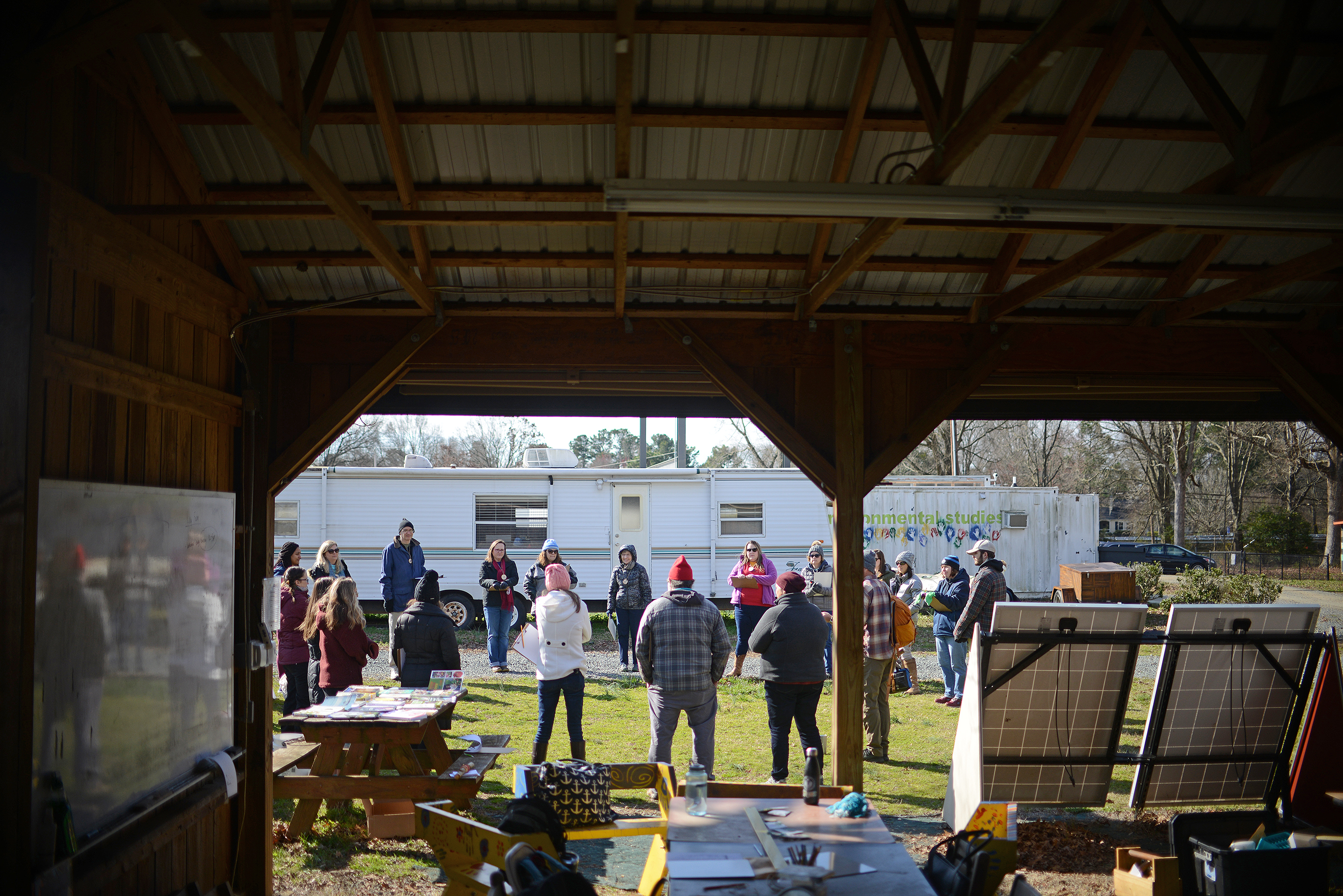Associate Professor of Education Scott Morrison and Assistant Professor of Education Katie Baker are introducing educators across the state to coursework that takes students outside the classroom.
As educators across the nation search for new ways to engage students inside the classroom, a pair of Elon professors are thinking outside of it.
“We want to think about approaches to teaching that allow entry for students’ ideas and for students to make contributions to the space,” Assistant Professor of Education Katie Baker told a group of teachers attending a Feb. 28 teacher workshop at Loy Farm.

Baker combined her passion for math with Associate Professor of Education Scott Morrison’s love of the outdoors for the workshop, which invited educators from across North Carolina to learn how to incorporate nature into their math lessons. Twenty-one educators, including elementary school teachers, college professors and even Elon education majors, attended the most recent workshop, which was Baker and Morrison’s third since the sessions began in 2019.
Morrison and Baker’s outdoor math lessons are meant to prioritize student thinking and problem-solving in ways that are safe, engaging, hands-on, thought-provoking and fun. The teacher workshops focus on bringing nature into the classroom, and taking students outside to supplement their education.
“Ask any student if they wanted to go outside more when they were in elementary school, middle school, even high school, and they always say ‘yes,'” Morrison said. “It’s about going into a place that’s way beyond where your school is so students can see math in everyday places.”

Workshop participants took part in a variety of activities to learn how to use outdoor resources to teach lessons. At one point, the workshop moved to Loy Farm’s forest classroom, where teachers worked to solve a math “story” that required the group to figure out how to split up six leaves equally among four friends. The group was able to use physical leaves lying on the ground around the forest as a hands-on method to solve the problem. The goal of this and other exercises was to help the teachers break down mental and physical barriers that would otherwise prevent them from applying these environmental tools to their everyday lesson plans.
Those barriers have been a focus for Amber Hawes ’17 since her time at Elon. As an Honors Fellow, Hawes researched environmental education with Morrison as her mentor, focusing on teacher access to outdoor resources and why those resources are often under utilized. Now a third-grade teacher at Oakhurst STEAM Academy in Charlotte, Hawes attended Morrison and Baker’s workshop in hopes sharing with other teachers the value of an outdoor education.
“One of the reasons why I came to the workshop was to re-spark that interest and find some motivation because it’s something I’m really passionate about, but it doesn’t really exist at my school,” Hawes said. “I’m trying to figure out how I can bring that back to my school and encourage other teachers to follow that as well.”
Seven teachers from New Hope Elementary School in Chapel Hill, North Carolina, attended the workshop for the same reason. Pam Zornick, a pre-K teacher at New Hope with 30 years of early education experience, says she sees how incorporating nature into classwork can impact even the youngest students at a school.

“I’m making sure that the kids that I have in my classroom are going to be ready to participate in the environment as they grow and learn by starting them out at pre-K age,” Zornick said.
For Baker and Morrison, the teacher workshops are exciting opportunities to send educators back to their classrooms with new skills and passion for outdoor learning.
“We have a drive to align what we’re doing in our coursework at Elon and bring it to the outside community as well,” Baker said. “We want to connect with teachers across the state and make a network of teachers interested in the work of revisioning what math looks like and what instruction looks like.”
And Morrison, who teaches three outdoor learning courses to Elon undergraduates, hopes to see the workshops continue to grow because he believes these lessons can can have a positive impact on students of all ages.
“Outside can be for play, and that’s wonderful because play is educational, but we can also be outside and meet our standards,” he said.



